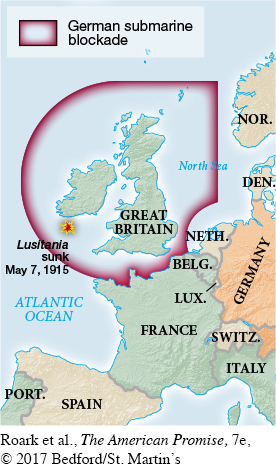The American Promise: Printed Page 621
The American Promise, Value Edition: Printed Page 568
The American Promise: A Concise History: Printed Page 647
The Ordeal of American Neutrality
Woodrow Wilson promptly announced that because the war engaged no vital American interest and involved no significant principle, the United States would remain neutral. Neutrality entitled the United States to trade safely with all nations at war, he declared. Unfettered trade, Wilson believed, was not only a right under international law but also a necessity because in 1913 the U.S. economy had slipped into a recession that wartime disruption of European trade could drastically worsen.
Although Wilson proclaimed neutrality, his sympathies, like those of many Americans, lay with Great Britain and France. Americans gratefully remembered crucial French assistance in the American Revolution and shared with the British a language, a culture, and a commitment to liberty. Germany, by contrast, was a monarchy with strong militaristic traditions. Still, Wilson insisted on neutrality, in part because he feared the conflict’s effects on the United States as a nation of immigrants. As he told the German ambassador, “We definitely have to be neutral, since otherwise our mixed populations would wage war on each other.”
Britain’s powerful fleet controlled the seas and quickly set up an economic blockade of Germany. The United States vigorously protested, but Britain refused to give up its naval advantage. The blockade actually had little economic impact on the United States. Between 1914 and the spring of 1917, while trade with Germany evaporated, war-

Germany retaliated with a submarine blockade of British ports. German Unterseebooten, or U-
The American Promise: Printed Page 621
The American Promise, Value Edition: Printed Page 568
The American Promise: A Concise History: Printed Page 647
Page 622American newspapers featured drawings of drowning women and children, and some demanded war. Calmer voices pointed out that Germany had warned prospective passengers and that the Lusitania carried millions of rounds of ammunition and so was a legitimate target. Secretary of State Bryan resisted the hysteria and declared that a ship carrying war materiel “should not rely on passengers to protect her from attack—
Wilson sought a middle course that would retain his commitment to peace and neutrality without condoning German attacks on passenger ships. On May 10, 1915, he announced that any further destruction of ships would be regarded as “deliberately unfriendly” and might lead the United States to break diplomatic relations with Germany. Wilson essentially demanded that Germany abandon unrestricted submarine warfare. Bryan resigned, predicting that the president had placed the United States on a collision course with Germany. Wilson replaced Bryan with Robert Lansing, who believed that Germany’s antidemocratic character and goal of “world dominance” meant that it “must not be permitted to win this war.”
The American Promise: Printed Page 621
The American Promise, Value Edition: Printed Page 568
The American Promise: A Concise History: Printed Page 647
Page 623After Germany apologized for the civilian deaths on the Lusitania, tensions subsided. And in 1916, Germany went further, promising no more submarine attacks without warning and without provisions for the safety of civilians. Wilson’s supporters celebrated the success of his middle-
Wilson’s diplomacy proved helpful in his bid for reelection in 1916. In the contest against Republican Charles Evans Hughes, the Democratic Party ran Wilson under the slogan “He kept us out of war.” Wilson felt uneasy with the claim, protesting that “they talk of me as though I were a god. Any little German lieutenant can push us into the war at any time by some calculated outrage.” But the Democrats’ case for Wilson’s neutrality appealed to enough of those in favor of peace to eke out a majority. Wilson won, but only by the razor-